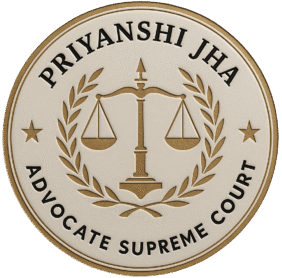
Bail is not just a legal term—it’s often a family’s first lifeline when someone is arrested. In India, the process of securing bail can feel overwhelming for those unfamiliar with the legal system. Whether you’re a family member trying to help or someone concerned about your rights, this article explains how bail works in India, who qualifies for it, and how Advocate Priyanshi Jha can help.
🔍 What Is Bail?
Bail is the temporary release of an accused person from custody, on the promise that they will appear in court when required. It is a legal mechanism that upholds the principle: “Innocent until proven guilty.”
Bail ensures:
- The accused can prepare their defense freely
- Their personal liberty is preserved during the trial
- Unnecessary detention is avoided
⚖️ Types of Bail in India
✅ 1. Regular Bail (Post-Arrest)
Granted after a person has been arrested and presented before a magistrate.
Filed under: Section 437 (Magistrate) or 439 (Sessions Court/High Court) of the CrPC
✅ 2. Anticipatory Bail (Pre-Arrest)
A person who apprehends arrest in a non-bailable offence may seek anticipatory bail before the arrest happens.
Filed under: Section 438 of the CrPC
✅ 3. Interim Bail
Temporary relief granted until the court decides on a regular or anticipatory bail application.
🧷 Bailable vs. Non-Bailable Offences
| Category | Bailable Offence | Non-Bailable Offence |
|---|---|---|
| Examples | Minor assault, public nuisance | Murder, rape, dowry death, economic fraud |
| Right to Bail | Granted as a matter of right | At the discretion of the court |
| Authority to Grant | Police or Magistrate | Magistrate, Sessions or High Court |
🧭 The Bail Process in India
Step 1: Arrest
The accused is arrested and taken into custody.
Step 2: Court Appearance
The police present the accused before a magistrate within 24 hours.
Step 3: Bail Application
A lawyer files for bail before the appropriate court (depending on offence type).
Step 4: Hearing
The prosecution and defense present their arguments.
Step 5: Order
The judge decides whether to grant bail, and under what conditions (surety, bond amount, restrictions).
👩⚖️ Advocate Priyanshi Jha’s Role in Bail Matters
With experience before the Supreme Court, Delhi High Court, and trial courts, Advocate Priyanshi Jha provides:
- 📜 Drafting of anticipatory and regular bail petitions
- ⚖️ Representation during bail hearings
- 🔍 Identifying procedural lapses in arrests or FIRs
- 🧾 Helping secure bail bonds and sureties
- 📞 Emergency legal support for families in distress
Her legal strategy is assertive in court and supportive outside it—ensuring clarity, confidence, and compliance throughout.
❓ Frequently Asked Questions (FAQs)
🔹 Q1: Can bail be denied in India?
A: Yes, especially in non-bailable offences or where there is flight risk, tampering of evidence, or prior criminal history.
🔹 Q2: How long does it take to get bail?
A: For bailable offences, it can be granted on the same day. Non-bailable offences may take days or weeks, depending on the court.
🔹 Q3: What is a surety in bail?
A: A person who guarantees the accused will comply with bail terms and appear in court.
🔹 Q4: Can bail be canceled?
A: Yes, if the accused violates conditions, threatens witnesses, or commits another offence.
📞 Need Help Filing for Bail?
If someone you care about has been arrested, don’t wait. Legal advice at the right time can prevent unnecessary custody. Advocate Priyanshi Jha offers rapid bail assistance, petition drafting, and court representation across Delhi and beyond.

